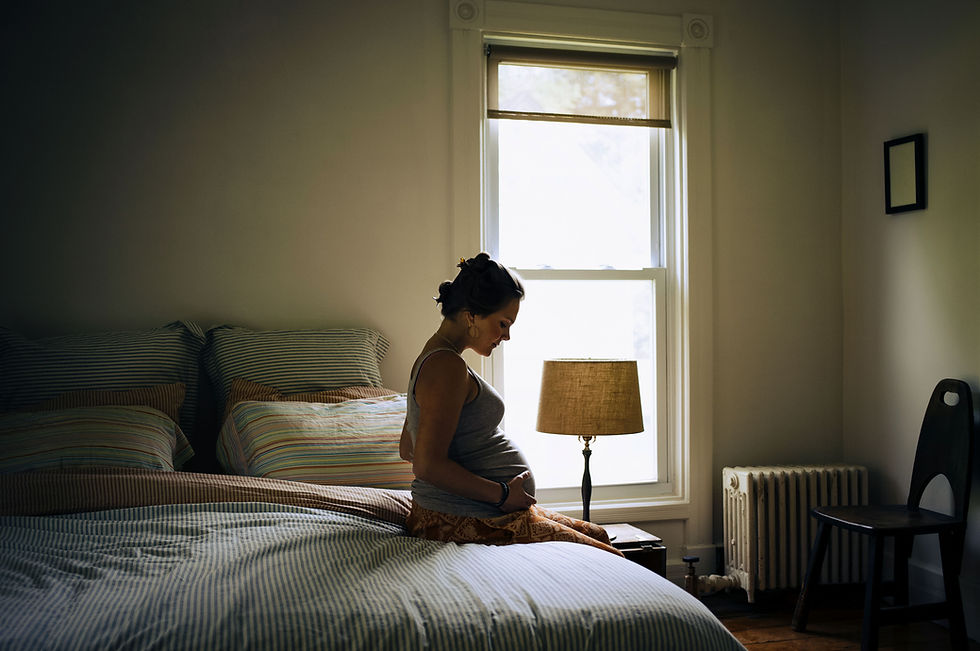How to feel less afraid of giving birth...
- Tuesday Watts-Overall

- Jan 22, 2024
- 4 min read
Feeling afraid of giving birth is a very normal response to most of the stories we hear about it and the depictions we see of it in the media. Feeling afraid of giving birth is also a very normal response to a previous experience of it that was difficult.
Fear is your mind’s way of trying to warn you of ‘danger’. It’s a threat detection mechanism. Fear of birth is your mind’s way of saying ‘this isn’t safe’.
Your body will react to this message from your mind - your heart beats faster, your muscles tense, your breathing gets shallow, you start producing adrenaline. Whilst these reactions have important functions in life but can be disruptive in birth.
Your fear has to feel powerful enough for you to take notice of the message in it i.e. ‘this isn’t safe’. For that reason it might feel like it can sometimes feel like the fear is stronger than you and impossible to overcome.
Your fear also wants you to avoid the thing you're afraid of e.g. avoiding thinking about birth, engaging with birth-related content or preparing for it in any way. In doing so, your mind believes that it’s keeping you safe. But by avoiding birth, the fear of it is maintained.

If you're feeling afraid of giving birth, but you're not sure where to start when it comes to overcoming that fear, here are 5 steps for you to work through:
Allow the fear - I talk to so many people who are afraid to look their fear in the face because they don’t want to make it worse. They are worried that by giving any focus to the fear, they’re not only going to make the fear itself stronger but they are going to make that scenario more likely. Often what people don't realise though is that by deliberately trying to suppress or ignore their fear, they can make the thoughts around it more intrusive So the first step to overcoming your fear of birth is allowing it. Ask yourself exactly what you're worried about or what possibility your mind is trying to 'warn' you about. Say it to yourself, write it down or share it with someone you know.
Get curious - oftentimes a person's fear of birth can be traced back to a particular source. Sometimes that's a previous experience of it. Other times it's a particular birth story, birth-related conversation or even a birth scene depicted in a film or tv show. If you're not entirely sure where your fear has come from ask yourself these questions and see what comes up for you - How was birth talked about when I was growing up? What are some of the things that I have heard/watched/read about birth?
Fill in the gaps - so often we form an impression of birth based on the subjective experiences and opinions of others as well as our own assumptions about what that experience might look like. It's important to acknowledge this where possible and to consider whether there are any gaps in your knowledge around birth. What are the facts around how birth happens? What does the evidence say about the possibility of a particular scenario or outcome? What are your birth-related options? A great way of answering these questions and getting a more accurate picture of birth is by doing a birth preparation course.
Plan for the birth you want - when I ask people what they want for their birth, often the answer is "a healthy baby". Of course, a healthy baby is what anyone would want, but when it comes to your birth that really is the bare minimum. When you picture yourself giving birth, where would you like to be? How would you like to be supported? What would you like to feel? With an understanding of what your options are (I cover these in Navigating Your Birth) allow yourself to plan for the birth you want. That doesn't guarantee any particular outcome, but it does help create and strengthen the neural networks in your brain which see that birth as a possibility (making it more likely).
Get your body on board - all of the above is important work for your mind. These steps are a big part of disrupting the automated fear responses that your brain has created when it comes to birth. But there is another vital piece to all of this - getting your body on board with your new perspective on birth. What I'm talking about here is nervous system regulation - learning how to recognise your body's reaction to fear (outlined above) and moving yourself to a state of calm with relaxation tools and breathing techniques. That is a skill that most of us are unfamiliar with but one that is incredibly vital - not just for birth but for life.

My name is Dr Tuesday Watts-Overall and helping people work through their worries ahead of birth and in life afterwards is a part of what I do. If you’d like any support with your birth- or postpartum-related worries, I offer 1:1 Coaching Sessions and Online Courses designed to do just that - go check them out!
You can also find me on Instagram for more on preparing birth and life beyond.
.png)



Comments